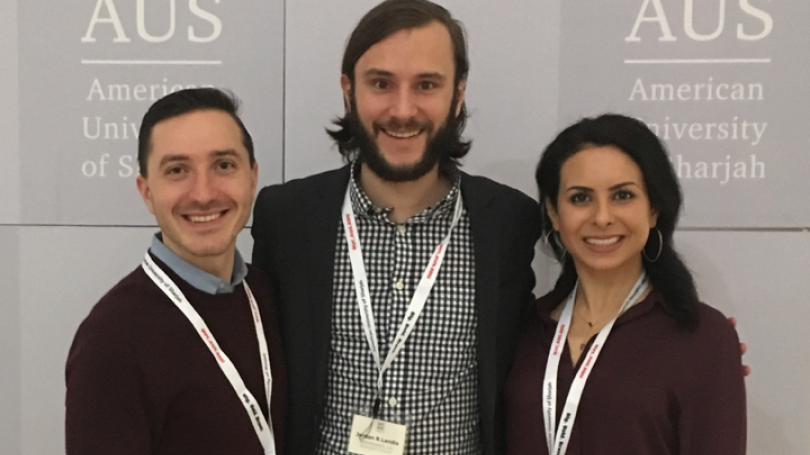
- About
- Education
- Research
- Thought Leadership
- Engagement
- News & Events
Back to Top Nav
Back to Top Nav
Back to Top Nav
Back to Top Nav
Back to Top Nav
Danielle Castley, a PhD candidate and Innovation Fellow at the Thayer School of Engineering, won the American University of Sharjah (AUS) New Venture Challenge award in February for her work in radiation-shielding materials. The AUS New Venture Challenge is a hard science investment competition that gives students the chance to pitch their business plan to venture capitalists and other interested parties. Danielle and her teammates Ian MacDonald (who recently completed his PhD at Northeastern) and Jordan Landis (currently enrolled in the MBA/MS engineering program at MIT) were the winners of this year’s competition and were awarded the first place prize of $50,000 to be invested in their company Neutroelectric.
Neutroelectric is a radiation management company founded by Danielle during her time at Dartmouth that focuses on developing radiation-shielding materials. Castley’s previous work in the nuclear industry made her aware of the need for lightweight radiation shields that can operate at high temperatures. The initial applications of her technology in the industry are to increase the lifetime of reactor components, to reduce the cost of reactor components, and improve the safety of spent nuclear fuel management. Using new material blends and manufacturing methods, Neutroelectric is developing a radiation shield that is both lightweight and effective in temperatures up to 300 degrees Celsius. During her participation in the NSF Innovation Corps program for her customer discovery, Castley learned that the radiation shield could save the average nuclear plant up to $100 million over its life cycle and simultaneously improve the safety of nuclear plants.
Danielle and her teammates travelled to Sharjah in the United Arab Emirates to participate in the inaugural AUS New Venture Challenge. Castley was well aware of the intensity of the competition even before it began: “I didn’t even expect to make it to the final round because of the calibre of the other teams. I was just thinking that we had to at least not embarrass ourselves since we had travelled all the way there!” Castley’s desire to deliver a respectable pitch to her audience led her to hire a presentation coach and work diligently on her team’s business plan and presentation with the help from professors from Thayer and Tuck. In addition to having a strong business plan, she points to her team’s appreciation for being at the competition, ability to integrate the judges’ feedback into their presentation between rounds, extensive preparation, and presentation skills as important contributors to her team’s success.
Danielle highlighted the skills fostered through Thayer’s PhD Innovation Program as essential in helping her develop the tools to become a successful entrepreneur. Danielle developed Neutroelectric’s business plan in her ENGS 321 class (taught by Professor Fossum) and spoke highly of the comprehensive education students receive at Thayer. “Dartmouth engineers have the potential to be successful entrepreneurs because Dartmouth produces such well-rounded engineers. The technology is only 25% of the business: Dartmouth gives you all the tools you need to successfully commercialize your research.” These tools include language classes, the alumni network, finance and business classes, and access to government-funded programs like the NSF Innovation Corps. Castley plans to finish her PhD at Thayer this summer and then hopes to start production pilot testing for Neutroelectric’s initial product offering in the fall.